Patients with acne who are treated with isotretinoin have fewer depressive symptoms and less psychological distress compared with patients who only receive oral antibiotics, a finding that is likely reflective of isotretinoin’s overall efficacy profile, according to study data published in the Journal of Drugs and Dermatology.
In this study, researchers evaluated responses to the Medical Expenditure Panel Survey, which included individuals who participated in the prior year’s National Health Interview Survey. Only patients with acne treated with isotretinoin (n=1,171,615) or oral antibiotics (n=7,875,279) were included in this study. Oral antibiotics included doxycycline, tetracycline, or minocycline.
The investigators compared the 2 treatment groups in regard to responses on the 2-item Patient Health Questionnaire-2 (PHQ-2) and Kessler 6-Item Psychological Distress Scale (K6). Both the PHQ-2 and K6 were completed during treatment.
Continue Reading
In an analysis adjusted for socio-demographic factors, patients administered isotretinoin had significantly fewer depressive symptoms compared with patients who took oral antibiotics, according to the mean PHQ-2 scores (0.280 vs 0.656, respectively; difference, 0.337; 95% CI, -0.503 to -0.171; P <.001). In addition, patients with acne who took isotretinoin also had less psychological distress, as measured by the K6 scores (2.494 vs 3.433; difference, 0.759; 95% CI, -1.493 to -0.024; P =.043).
A primary limitation of this study was the lack of direct assessment of acne severity, which limited the investigators’ ability to determine whether isotretinoin-treated patients had worse acne at baseline compared with those treated with oral antibiotics.
In addition to the relationship between isotretinoin’s efficacy profile and the therapy’s anti-depressant effect, the researchers also suggest that the drug’s ability to decrease neuroinflammation could also explain its effects on mental health. Studies have “shown that inflammation plays a larger role in acne, and recent reports have linked inflammation with neuropsychiatric disorders,” the investigators wrote.
Disclosure: Several study authors declared affiliations with the pharmaceutical industry. Please see the original reference for a full list of authors’ disclosures.
Reference
Hekmatjah J, Chat VS, Sierro TJ, Read C, Kassardjian AA, Armstrong AW. Differences in depression and distress between acne patients on isotretinoin vs oral antibiotics. J Drugs Dermatol. 2021;20(2):172-177. doi:10.36849/JDD.5559
